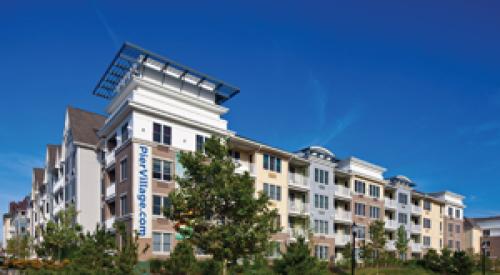No big surprise: entries for this year's Best Workplaces are down a bit amid layoffs; salary freezes and cuts; and the fact that some companies have simply gone out of business since last year's survey. But, happily, there are companies that have bucked the expectation of disgruntled employees ready to jump ship. This year's best workplaces have cultivated loyalty and a willingness to do double duty to help their companies ride out the current housing dip. These companies understand that a huge part of their success is their people, so they are willing to invest in them. And in these uncertain times, their staffs have not forgotten what has been done for them.
"I've got the best employees," says Doug Tripp, president of Tripp Trademark Homes, one of our finalists. "They are really looking to [find out] what else can they do to help us. Our receptionist has gone out into the field and is working as a hostess on her days off in our sales office. A couple of guys brought lawn mowers in to mow some of our inventory houses. The sales, construction and service people will vacuum the models on Friday afternoon instead of us paying a cleaning person, so that they look good during the weekend. I didn't tell them to do those things."
He adds that they were able to avoid some layoffs because staff were willing to take pay reductions for the benefit of the whole. "If people are willing to do that and not leave, that's loyalty," says Tripp.
Agreed. This year we are honoring six Best Workplaces: three top building companies with 100 or fewer employees, and three top building companies with more than 100 employees.
A common theme coming from those we spoke to at these companies is that the time and money spent to make employees feel heard, respected and motivated — be it through unique benefits, a good work/life balance, educational opportunities or fun get-togethers — is worth it. As belts tighten and situations seem dour, these companies have cultivated employees for such a time as this. They seem ready and willing to do what it takes to keep their companies going.
Overall scores for survey participants were lower this year than last. But one thing that has stayed amazingly consistent is the percentage of respondents who strongly agree that they expect to be working for their current employer in the next two years. This year 71.2 percent agreed; last year just over 70 percent said so. (Note: There is a slight discrepancy in how total scores were evaluated last year and this year. Proportionally the scores were the same amongst last year's companies; the total scores this year were tallied differently.)
Scores were highest on the statements "I would recommend this company to others as a good place to work" at 75.4 percent — just a few points higher than last year's 72.4 percent — and "I would rate this company as a great place to work compared to other companies I know about" — 77.5 percent — up a bit from last year's 74.9 percent. (Hey, why even fill out the survey if you don't agree with that?)
Wallen Homes got several perfect scores. It scored 100 percent on all three questions relating to confidence in management's leadership ability ("I understand my company's business strategy and goals"; "I understand how my work fits into my company's business strategy"; "I have trust and confidence in the overall job being done by the senior leadership team of this company"). The average scores in this category were fairly good overall (66.1, 72 and 73.6 percent respectively). Traton Homes had 93 percent who strongly agreed that they understand how their work fits into their company's business strategy; Trendmaker had 92 percent who felt that way.
Wallen Homes scored 100 percent in two areas of customer service ("I would rate this company highly on satisfying its customers"; "I would rate this company highly on providing quality customer service"). Wallen also scored 100 percent three times out of a possible four in the category of workplace culture and environment on questions concerning work/life balance; a climate of mutual respect among employees of different backgrounds; and encouraging teamwork and collaboration. Overall average scores on work/life balance were 59 percent; mutual respect, 71 percent and teamwork/collaboration, 73.5 percent. Last year the overall scores were, 53.3, 62 (almost a 10 percent increase this year!) and 70.3 percent, respectively, bucking the trend of lower scores this year. But it's not surprising that pleasing customers is top of mind in this current sales environment.
Wallen was bested only by Trendmaker on the question, "My company employs strong, ethical principles in its business practice" — the fourth question under the category of workplace culture. Wallen scored 89 percent versus Trendmaker's 93 percent. The overall average score was 75.6 percent.
Tripp Trademark scored high in two areas of corporate and social responsibility. Ninety-three percent strongly agreed, "My company actively supports community outreach, public service and charitable work," which was the highest score this year on that particularly question; and 93 percent also strongly agreed that, "My company contributes to the local building industry, economy and corporate community," a score second only to Wallen's 100 percent. The overall average was 66 percent and 69 percent respectively. The overall average score this year on "My company practices environmentally responsibility in its operations" was 57.1 percent compared to 62.8 last year. Wallen and Trendmaker scored far above average at 89 and 80 percent, respectively, on this question.
As was the case last year, some of the lowest scores overall were in the area of recruitment and retention, presumably for the same reasons — more folks are being let go than recruited or retained. A mere 42.6 percent strongly agree that they are being groomed for a position of increased responsibility, or, if managers, are grooming at least one staff member for such a position. Last year the number was 49.57. Only 43 percent say open positions are being filled in a timely manner, fairly even with last year's 43.9 percent. What's more likely is that these positions are being left open indefinitely or eliminated completely.
Under the category of compensation and benefits, only 41.7 percent strongly agreed that their salary is competitive with similar positions in other companies, compared to a similar 43.7 percent last year. And in terms of professional development, education and training, only 42.2 percent strongly agree that their company's mentoring program has helped them develop important skills, compared with 47.10 percent last year. A low 46.6 percent of all respondents strongly believe the better their performance, the better their pay will be. The number is down from 51.7 percent last year.
|
























